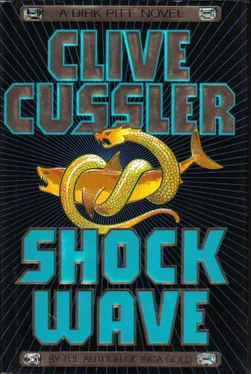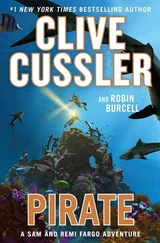Clive Cussler - Shock Wave
Здесь есть возможность читать онлайн «Clive Cussler - Shock Wave» весь текст электронной книги совершенно бесплатно (целиком полную версию без сокращений). В некоторых случаях можно слушать аудио, скачать через торрент в формате fb2 и присутствует краткое содержание. Год выпуска: 1996, ISBN: 1996, Издательство: Simon & Schuster, Жанр: Детектив, на английском языке. Описание произведения, (предисловие) а так же отзывы посетителей доступны на портале библиотеки ЛибКат.
- Название:Shock Wave
- Автор:
- Издательство:Simon & Schuster
- Жанр:
- Год:1996
- ISBN:978-0684802978
- Рейтинг книги:5 / 5. Голосов: 1
-
Избранное:Добавить в избранное
- Отзывы:
-
Ваша оценка:
- 100
- 1
- 2
- 3
- 4
- 5
Shock Wave: краткое содержание, описание и аннотация
Предлагаем к чтению аннотацию, описание, краткое содержание или предисловие (зависит от того, что написал сам автор книги «Shock Wave»). Если вы не нашли необходимую информацию о книге — напишите в комментариях, мы постараемся отыскать её.
Shock Wave — читать онлайн бесплатно полную книгу (весь текст) целиком
Ниже представлен текст книги, разбитый по страницам. Система сохранения места последней прочитанной страницы, позволяет с удобством читать онлайн бесплатно книгу «Shock Wave», без необходимости каждый раз заново искать на чём Вы остановились. Поставьте закладку, и сможете в любой момент перейти на страницу, на которой закончили чтение.
Интервал:
Закладка:
Pitt saw the helicopter turn head-on, saw the flash from the guns in the pods, heard the shells punching into the big radial engine. Oil suddenly spurted from under the cowling, streaming onto the exhaust stacks and causing a dense trail of blue smoke to streak behind the plane. Pitt held up a hand to shield his eyes from the hot oil splattering against his face in stinging torrents from the airstream.
The sight that froze in his memory a microsecond before the impact was the expression of grim acceptance on the face of the helicopter’s pilot.
The prop and engine of the floatplane smashed squarely into the helicopter just behind the cockpit in an explosion of metal and debris that sheared off the tail rotor boom. Deprived of its torque compensation, the main body of the helicopter was thrown into a violent lateral drift. It spun around crazily for several revolutions before plummeting like a stone, five hundred meters to the ground. Unlike special-effects crashes in motion pictures, it didn’t immediately burst into flames after crumpling into an unrecognizable mass of smoldering wreckage. Nearly two minutes passed before flames flickered from the debris and a blinding sheet of flame enveloped it.
Pieces of the Beaver’s shattered propeller spun into the sky like a fireworks pinwheel. The cowling seemed to burst off the engine and fluttered like a wounded bird into the trees. The engine froze and stopped as quickly as if Pitt had turned off the ignition switch. He wiped the oil from his eyes, and all he could see over the exposed cylinder heads was a carpet of treetops. The Beaver’s airspeed fell off, and she stalled as he braced himself for the crash. The controls were still functioning, and he tried to float the plane down into the upper tree limbs.
He almost made it. But the outer edge of the right wing collided with a seventy-meter-tall red cedar, throwing the aircraft into an abrupt ninety-degree turn. Now totally out of control and dead in what little sky was left, the plane plunged into a solid mass of trees. The left wing wrapped itself around another towering cedar and was torn away. Green pine needles closed over the red plane, blotting it out from any view from above. The trunk of a fir tree, half a meter wide, rose in front of the battered aircraft. The propeller hub struck the tree head-on and punched right through it. The engine was pulled from its mountings as the upper half of the tree fell across the careening aircraft and knocked off the tail section What remained of the wreckage plowed into the moist compost earth of the forest floor before finally coming to a dead stop.
For the next few minutes the ground below the trees was as silent as a cemetery. Pitt sat there, too stunned to move. He stared dazedly through the opening that was once the windshield. He noticed for the first time that the entire engine was gone and wondered vaguely where it went. At last his mind began to come level again, and he reached over and examined Stokes.
The Mountie shuddered in a fit of coughing, then shook his head feebly and regained a small measure of consciousness. He stared dumbly over the instrument panel at the pine branches that hung into the cockpit. “How did we come down in the forest?” he mumbled.
“You slept through the best part,” Pitt muttered, as he tenderly massaged a gang of bruises.
Pitt didn’t require eight years of medical school to know Stokes would surely die if he didn’t get to a hospital. Quickly, he unzipped the old flying suit, ripped opened the Mountie’s shirt and searched for the wound. He found it to the left of the breastbone, below the shoulder. There was so little blood and the hole was so small, he almost missed it. This wasn’t made by a bullet, was Pitt’s first reaction. He gently probed the hole and touched a sharp piece of metal. Puzzled, he looked up at the frame that once held the windshield. It was smashed beyond recognition. The impact of a bullet had driven a splinter from the aluminum frame into Stokes’ chest, penetrating the left lung. Another centimeter and it would have entered the heart.
Stokes coughed up a wad of blood and spit it out the open window. “Funny,” he murmured, “I always thought I’d get shot in a highway chase or in a back alley.”
“No such luck.”
“How bad does it look?”
“A metal splinter in your lung,” Pitt explained. “Are you in pain?”
“More of a throbbing ache than anything else.”
Pitt stiffly rose out of his seat and came around behind Stokes. “Hang on, I’ll get you out of here.”
Within ten minutes, Pitt had kicked open the crumpled entry door and carefully manhandled Stokes’ deadweight outside, where he gently laid him on the soft ground. It took no small effort, and he was panting heavily by the time he sat next to the Mountie to catch his breath. Stokes’ face tightened in agony more than once, but he never uttered so much as a low moan. On the verge of slipping into unconsciousness, he closed his eyes.
Pitt slapped him awake. “Don’t black out on me, pal. I need you to point the way to Mason Broadmoor’s village.”
Stokes’ eyes fluttered open, and he looked at Pitt questioningly, as if recalling something. “The Dorsett helicopter,” he said between coughs. “What happened to those bastards who were shooting at us?”
Pitt stared back at the smoke rising above the forest and grinned. “They went to a barbecue.”
Pitt had expected to trudge through snow in January on Kunghit Island, but only a light blanket of the white stuff had fallen on the ground, and much of that had melted since the last storm. He pulled Stokes along behind him on a travois, a device used for hauling burdens by American Plains Indians. He couldn’t leave Stokes, and to attempt carrying the Mountie on his back was inviting internal hemorrhaging, so he lashed two dead branch poles together with cargo tie-down straps he scrounged in the wreckage of the aircraft. Rigging a platform between the poles and a harness on one end, he strapped Stokes to the middle of the travois. Then throwing the harness end over his shoulders, Pitt began dragging the injured Mountie through the woods. Hour followed hour, the sun set and night came on as he struggled north through the darkness, setting his course by the compass he’d removed from the aircraft’s instrument panel, an expedient he had used several years previously when trekking across the Sahara Desert.
Every ten minutes or so Pitt asked Stokes, “You still with me?”
“Hanging in,” the Mountie repeated weakly.
“I’m looking at a shallow stream that runs to the west.”
“You’ve come to Wolf Creek. Cross it and head northwest.”
“How much farther to Broadmoor’s village?”
Stokes replied in a hoarse murmur. “Two, maybe three kilometers.”
“Keep talking to me, you hear?”
“You sound like my wife...”
“You married?”
“Ten years, to a great lady who gave me five children.”
Pitt readjusted the harness straps, which were cutting into his chest, and pulled Stokes across the stream. After plodding through the underbrush for a kilometer, he came to a faint path that led in the direction he was headed. The path was grown over in places, but it offered relatively free passage, a godsend to Pitt after-having forced his way through woods thick with shrubs growing between the trees.
Twice he thought he’d lost the path, but after continuing on the same course for several meters, he would pick it up again. Despite the freezing temperature, his exertions were making him sweat. He dared not allow himself to stop and rest. If Stokes was to live to see his wife and five children again, Pitt had to keep going. He kept up a one-way conversation with the Mountie, fervently trying to keep him from drifting into a coma from shock. Concentrating on keeping one foot moving ahead of the other, Pitt failed to recognize anything strange.
Читать дальшеИнтервал:
Закладка:
Похожие книги на «Shock Wave»
Представляем Вашему вниманию похожие книги на «Shock Wave» списком для выбора. Мы отобрали схожую по названию и смыслу литературу в надежде предоставить читателям больше вариантов отыскать новые, интересные, ещё непрочитанные произведения.
Обсуждение, отзывы о книге «Shock Wave» и просто собственные мнения читателей. Оставьте ваши комментарии, напишите, что Вы думаете о произведении, его смысле или главных героях. Укажите что конкретно понравилось, а что нет, и почему Вы так считаете.












